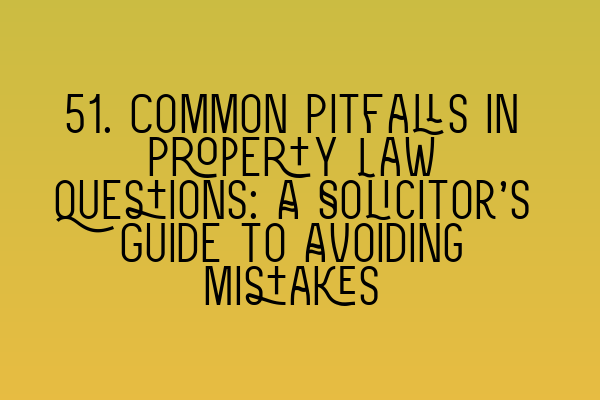51 Common Pitfalls in Property Law Questions: A Solicitor’s Guide to Avoiding Mistakes
Property law can be a complex and confusing area of law, with many potential pitfalls for solicitors and aspiring solicitors. As a leading solicitor at SQE Property Law & Land Law, I have encountered numerous cases where simple mistakes have had significant consequences. In this guide, I will highlight 51 common pitfalls in property law questions and provide useful insights to help you avoid making these mistakes in your own practice.
- Failure to conduct thorough title searches: Properly investigating the title is crucial to identify any encumbrances or defects that may affect the property. Neglecting this step can lead to legal disputes and financial loss.
- Ignorance of local zoning regulations: Each locality has its own zoning laws that determine how properties can be used. Failing to consider these regulations can result in non-compliant use or development.
- Inadequate due diligence: Conducting comprehensive due diligence is essential to uncover any hidden risks associated with the property. This includes reviewing leases, contracts, and environmental reports.
- Failure to obtain necessary planning permissions: Before undertaking any construction or development, it is crucial to obtain the required planning permissions. Failure to do so can result in costly fines and demolition orders.
- Overlooking restrictive covenants: Restrictive covenants can restrict specific actions or uses of a property. Failure to acknowledge and comply with these covenants can lead to legal disputes with neighboring landowners.
- Improperly drafted leases: A poorly drafted lease can create ambiguity and confusion for both landlords and tenants. It is important to ensure that leases are clear, comprehensive, and in compliance with relevant laws.
- Failure to address property defects: When acting for a buyer, it is essential to thoroughly inspect the property for any defects that may affect its value or suitability. Failing to address these defects can result in negligence claims against the solicitor.
- Failure to register property transfers: Failing to register property transfers with the Land Registry can render the transfer legally ineffective. It is crucial to complete the necessary registration formalities to protect your client’s interests.
- Mismanagement of client funds: Solicitors must handle client funds with the utmost care and adhere to regulatory requirements. Mishandling client money can lead to professional misconduct allegations and severe disciplinary action.
- Failure to advise on tax implications: Property transactions can have significant tax implications. Failing to advise clients on these implications can result in legal and financial consequences.
- Missed deadlines: Property transactions often involve strict deadlines, such as the completion date or the expiration of an option. Missing these deadlines can jeopardize the entire transaction and lead to legal disputes.
- Failure to consider rights of way: Rights of way over a property can impact its value and functionality. Neglecting to consider these rights can result in disputes and hinder the client’s enjoyment of the property.
- Inaccurate property descriptions: Providing inaccurate property descriptions can mislead buyers and lead to misrepresentation claims. It is crucial to ensure that property particulars and marketing materials are truthful and accurate.
- Failure to advise on potential liabilities: Property transactions often involve potential liabilities, such as environmental contamination or ongoing litigation. Failing to advise clients on these liabilities can result in legal and financial consequences.
- Insufficient knowledge of building regulations: Property transactions may involve compliance with building and construction regulations. It is essential to have a thorough understanding of these regulations to ensure compliance.
- Failure to consider leasehold enfranchisement: Leasehold enfranchisement is an important consideration for leaseholders looking to extend their lease or purchase the freehold. Failing to advise on enfranchisement rights can result in missed opportunities for the client.
- Lack of understanding of land registration requirements: Land registration requirements can vary depending on the type of property and its location. It is crucial to have a comprehensive understanding of these requirements to effectively represent your clients.
- Ignoring adverse possession claims: Adverse possession allows individuals to claim ownership of land they have occupied for a certain period. Ignoring adverse possession claims can lead to disputes and potential loss of the client’s rights.
- Failure to consider co-ownership arrangements: Property transactions involving co-ownership require careful consideration of the parties’ rights and obligations. Failing to do so can lead to disputes and the dissolution of the co-ownership arrangement.
- Inadequate consideration of mortgage requirements: When acting for a lender or borrower, it is essential to consider the lender’s requirements and ensure compliance with mortgage conditions. Failure to do so can result in default and repossession.
- Overlooking rights of first refusal: Certain property transactions trigger rights of first refusal, allowing existing owners or tenants the opportunity to purchase the property before it is sold to a third party. Neglecting these rights can invalidate the transaction.
- Failure to address boundary disputes: Boundary disputes can arise between neighboring landowners and can result in costly litigation. It is crucial to address these disputes effectively and mitigate potential legal consequences.
- Underestimating the impact of easements: Easements grant specific rights of use over a property to third parties. Failing to consider the impact of existing easements can limit the client’s use and enjoyment of the property.
These are just a few of the common pitfalls to watch out for in property law questions. As a solicitor, it is essential to stay updated with the latest developments in property law and continually refine your skills and knowledge.
To further enhance your understanding of property law and prepare for the SQE exams, consider exploring our related articles and resources:
- SQE 1 Practice Exam Questions
- SQE 1 Practice Mocks FLK1 FLK2
- SQE 2 Preparation Courses
- SQE 1 Preparation Courses
- SRA SQE Exam Dates
By honing your skills and avoiding these common pitfalls, you can position yourself as a competent and reliable property law solicitor. Remember, professional growth and success require continuous learning and a commitment to excellence.
